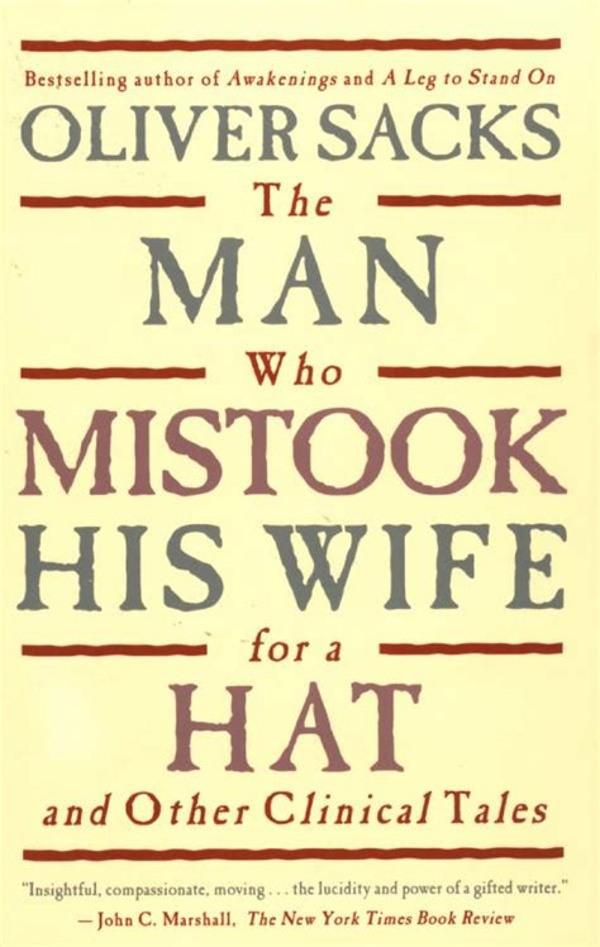The Man Who Mistook His Wife for a Hat
 |
 |
 |
 |
 |

- Publication Date: 1985
- Written by: Oliver Sacks
- Page count: 242
The Man Who Mistook His Wife for a Hat was never a book that I planned on reading. I had never heard of it before, nor had I ever heard of its author, Oliver Sacks. My girlfriend had heard the book mentioned by a YouTuber we both enjoyed, so, thinking I'd like it, she bought a copy for me for Christmas in 2022. The title was certainly eye-catching, but I wasn't sure what to expect with the book going forward, as I wasn't really reading non-fiction at the time. What I got was a great little surprise, and a super interesting introduction to an author I find very fascinating.
The book is a collection of case studies of various patients that Sacks worked with through the years. Each patient suffered from a different neurological disorder, and he worked with them to diagnose what the issue was and how they could cope with it. All of the patients came from various walks of life, and their ailments ranged from quirky to sadly bizarre. For example, the titular "Man Who Mistook His Wife for a Hat" was a well-regarded music teacher who slowly lost the ability to recognize people's faces. He would sometimes see people's faces in inanimate objects, and would strike up a conversation with them instead. As there is no cure for this ailment, Dr. Sacks encouraged him to keep his focus on music itself, since he never lost any ability to understand and appreciate it. Another example featured a man do didn't perceive his left leg as attached to his body. He kept thinking it was a severed limb, and would throw himself out of bed to get it away from him. My favorite case featured a group of patients who were unable to understand words on their own, but could understand meaning and expression. As they were watching the President (presumably Reagan at the time) give a speech, they kept laughing at him because they could tell he was lying without comprehending his actual words.
Dr. Sacks writes about these patients in a very humanizing way. While he does have some humorous exchanges between them, he never once talks down to his patients or treats them as sideshow freaks. Each one is featured under a pseudonym to protect their identity, and he goes into great detail about their specific ailments to help the reader understand why their brains are acting this way. There are also a lot of footnotes with each case that, while a little bit dense, provide even more medical analysis and comparisons between cases. You can tell that he was a very caring and curious man who genuinely wanted the world to understand and empathize with the people he treated in his job. The way that Carl Sagan made astronomy popular with the masses in Cosmos, Dr. Sacks seemed to be doing the same here with the human brain. I was really sucked in by some of the stories in this book, and it led me to read a bit more about his life and career. Through this, I found Dr. Sacks' earlier book, Awakenings, which really helped me to understand just how significant he was in his field.
The Man Who Mistook His Wife for a Hat is a surprisingly fun look inside some different wirings of the human mind. While it's full of some dense medical terms at times, it's easy to understand and written with enough care and attention to keep you turning the pages. It gave me a new understanding some ways of living that I had never even thought about before, and I think that that understanding can help a lot of readers develop empathy for those who are suffering from mental ailments. Sometimes, blind reads can be some of the most interesting and rewarding ones.



